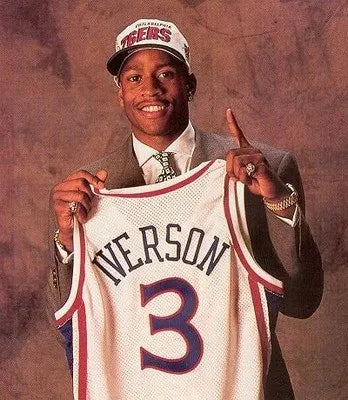This Day in History: AI Arrives to the NBA
November 1, 1996, marked the beginning of a new era in the NBA. It was the day when a diminutive rookie from Georgetown University, Allen Iverson, made his professional basketball debut for the Philadelphia 76ers. As he stepped onto the court, no one could have predicted the immense cultural impact he would have on the sport of basketball and the world beyond.
In this blog post, we'll journey through the life and career of Allen Iverson, exploring the profound influence he had on the game, from the way it was played to the fashion, the attitude, and even the music that accompanied it.

The Answer Arrives
Allen Iverson, affectionately known as "AI," was the first overall pick in the 1996 NBA Draft, selected by the Philadelphia 76ers. Standing at just 6 feet tall and 165 pounds, Iverson wasn't the prototype of the typical NBA player at the time. However, what he lacked in physical stature, he more than compensated for with his extraordinary speed, agility, and unrivaled skill.
AI's debut on November 1, 1996, was a glimpse of what was to come. He scored 30 points against the Milwaukee Bucks and demonstrated a level of intensity and passion that would become his trademark. It wasn't just about his incredible basketball talent, though; it was about his audacity, his swagger, and his unapologetic individuality.
Crossover Dribbles and Tattoos: A New Style
Allen Iverson was a trailblazer in more ways than one. He popularized the crossover dribble, a move that left defenders stumbling in his wake. His fearless drives to the basket and ability to score from anywhere on the court redefined the point guard position.
Off the court, Iverson's style was equally revolutionary. He wore his hair in cornrows and sported tattoos at a time when such expressions of individuality were not as prevalent in the league. His fashion choices, including oversized jerseys, headbands, and baggy pants, transcended the world of sports and influenced urban fashion.
A Cultural Icon
AI's impact extended beyond basketball courts and fashion trends. He was a cultural icon, representing a new generation of athletes who were unafraid to be themselves. His resilience and refusal to conform to established norms resonated with fans from all walks of life.
Iverson also played a pivotal role in the popularization of hip-hop culture within the NBA. His love for the genre was evident in his music choices, and he introduced a whole new generation of basketball fans to the music and lifestyle associated with it.
Breaking Down Barriers
Throughout his career, Iverson faced his share of adversity, both on and off the court. He was unapologetically himself and did not conform to conventional expectations. His authenticity made him a hero for those who felt marginalized or misunderstood.
He also broke down racial and cultural barriers in the league. As a young, Black athlete who was unapologetically himself, Iverson challenged stereotypes and provided a sense of representation for many who had not seen themselves in the world of professional sports.
Allen Iverson's legacy in basketball extends far beyond the box score. He redefined the sport, introducing a new level of style, individuality, and authenticity that transcended the court. His impact on culture, fashion, and the perception of professional athletes was monumental.
Allen Iverson wasn't just a basketball player; he was an agent of change, a symbol of resilience, and a cultural icon who left an indelible mark on the world of sports and beyond. His debut on November 1, 1996, marked the start of a revolution that forever altered the landscape of basketball, and his influence continues to resonate with athletes and fans to this day.
